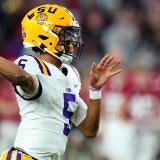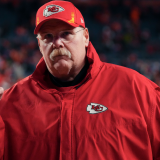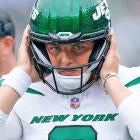NFL teams have started devoting more attention to signing players in a contract year to extensions since the NFL Draft has taken place. The Browns have gotten the ball rolling with linebacker Christian Kirksey. He received a four-year, $38 million extension with $20 million in guarantees. Signings during the summer and leading up to the start of the regular season took players that would have been franchise tag candidates or highly sought after in free agency off the market last year. These players included Colts quarterback Andrew Luck, Saints quarterback Drew Brees, Cardinals defensive back Tyrann Mathieu, Eagles defensive tackle Fletcher Cox, Vikings safety Harrison Smith, Packers offensive tackle David Bakhtiari, Seahawks wide receiver Doug Baldwin and Lions cornerback Darius Slay.
An emerging trend is for teams to sign first-round picks with fifth-year options to extensions with two years remaining on their contracts. Five 2013 first-round picks (Tavon Austin, Travis Frederick, Eric Fisher, Lane Johnson, and Kyle Long) received extremely early extensions in 2016.
Early contract extensions can allow teams to lock up very good to great players for a number of years at more affordable rates than if their contracts had expired. For example, the Texans got a great value with three-time NFL Defensive Player of Year J.J. Watt by extending his contract in 2014 when there were two years remaining on his rookie deal, which included a fifth-year option for $6.969 million in 2015.
Watt's six-year, $100 million extension made him the NFL's highest-paid non-quarterback and contained $51,876,385 million in guarantees, which set a record for defensive players at the time. Both benchmarks have since been eclipsed. Watt is currently the seventh highest-paid non-quarterback (by average yearly salary) and ranks ninth in overall contract guarantees among defensive players. He is going to continue dropping down the list in these contract metrics, since his deal expires after the 2021 season.
If Watt had played his fourth NFL season in 2014 under his rookie deal, the Texans would have been forced to pay him more than Ndamukong Suh, who signed a six-year, $114.375 million contract averaging $19,062,500 per year with the Dolphins in 2015 as a free agent, or face the prospect of using an exclusive franchise tag on him last offseason.
Here are 10 players that could sign contract extensions prior to the start of the regular season.
Derek Carr, QB, Raiders
Getting Carr under contract long term is a major offseason priority for Raiders general manager Reggie McKenzie. The 2014 second-round pick is arguably the NFL's biggest bargain. He is scheduled to make $1,152,519 in 2017, which is the final year of his rookie contract.
Carr refuted recent reports last week that he was frustrated with the pace of negotiations. He indicated he has complete faith that his new deal will be in place before training camp starts in late July. Nonetheless, Carr has set a deadline for reaching an agreement. He will end negotiations and play out his contract once training camp starts. Carr could become the NFL's first $25 million-per-year player, eclipsing the five-year, $122.97 million extension Luck received last offseason from the Colts. Luck reset the NFL pay scale with a deal that averages $24.594 million per year and contains $87 million in guarantees, of which $47 million fully guaranteed at signing.
Matthew Stafford, QB, Lions
Preliminary discussions for a new contract have already started, but Stafford doesn't have incentive to sign a new deal before Carr does. Carr raising bar for quarterback salaries would become the new floor for any Stafford extension.
Stafford has tremendous leverage after proving in 2016 he could thrive without six-time Pro Bowl wide receiver Calvin Johnson, who retired prematurely after the 2015 season. The Lions earned a wild-card berth in 2016 with Stafford engineering eight game-winning drives and leading eight fourth-quarter comebacks, both NFL bests.
The Lions allowing Stafford to play out his contract then playing the franchise tag game could be more costly. It will be $26.4 million (120 percent of his $22 million 2017 salary cap number) to use a non-exclusive franchise tag on Stafford in 2018. A second franchise tag in 2019, another 20 percent raise, would cost the Lions $31.68 million. The top of quarterback market could have a dramatic shift because Aaron Rodgers is expected to sign a new deal with the Packers in 2018 when there are two years left on his current contract, and the Falcons will likely extend reigning NFL MVP Matt Ryan's contract next year as well since he will be in a contract year.
Devonta Freeman, RB, Falcons
Kristin Campbell, Freeman's agent, has been angling for her client to get a new contract paying him like an elite running back since Super Bowl week. Falcons general manager Thomas Dimitroff recently expressed confidence about working out a new deal.
Freeman is the only running back to rush for at least 1,000 yards in each of the last two seasons. His 2,135 rushing yards are second only to LeSean McCoy's 2,162 yards during this span. Freeman also leads NFL running backs over the 2015 and 2016 seasons with 3,175 yards from scrimmage (combined rushing and receiving yards).
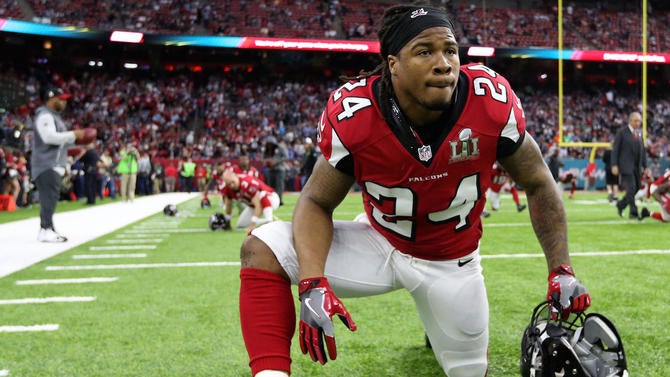
Unfortunately for Freeman, elite running back money isn't what it used to be. Running back salaries reached a peak in 2012. The average of the top five running back contracts was approximately $10.85 million per year and contained almost $26 million in guarantees where the average length was five years.
LeSean McCoy is currently the NFL's highest-paid running back. The five-year contract he received in 2015 when the Eagles dealt him to the Bills is worth $40.05 million with $26.55 million in guarantees. Le'Veon Bell was franchised by the Steelers in March for $12.12 million.
Three of the top five veteran running back contracts were signed last year in free agency. Doug Martin led the way by re-signing with the Buccaneers for $35.75 million (worth up to $42,937,500 with salary escalators and incentives) over five years where $15 million was fully guaranteed. Lamar Miller received a five-year, $32.5 million contract with $14 million fully guaranteed from the Texans. Chris Ivory signed a five-year, $32 million deal (worth a maximum of $35 million through salary escalators) with the Jaguars.
The Falcons should be willing to pay Freeman in the same neighborhood as Martin, Miller and Ivory. If Freeman doesn't find this level of compensation satisfactory, he might need to wait and see whether Bell resets the running back market before the July 15 deadline for franchise players to sign long-term deals in order to get a deal comparable to or better than McCoy's.
DeAndre Hopkins, WR, Texans
General manager Rick Smith expressed his desire to re-sign Hopkins when addressing the media at the NFL combine in early March. The 2013 first-round pick probably feels a new contract is long overdue. He staged a one-day holdout when training camp opened last year protesting the Texans' refusal to negotiate an extension before his fourth year, which was done with 2011 and 2012 first-round picks Watt and Whitney Mercilus.
Hopkins never developed chemistry with big-money free-agent passer Brock Osweiler in 2016, and it showed statistically. He caught 78 passes for 954 yards with four touchdowns. This was after arguably having the most impressive 2015 season of any wide receiver (111 catches, 1,521 yards, 11 touchdowns) considering he had a bunch of mediocre at best quarterbacks (Brian Hoyer, Ryan Mallett, Brandon Weeden and T.J. Yates) throwing to him.
The down year won't prevent Hopkins from seeking elite wide receiver money. Although Antonio Brown reset the wide receiver market in February with a four-year extension averaging $17 million per year, a new deal is more likely to put Hopkins in the same salary stratosphere as Dez Bryant, Demaryius Thomas, Julio Jones and A.J. Green. These deals, which were signed in 2015, average between $14 million and $15 million per year. With the exception of Green, the players received between $43.5 million and $47 million of guarantees in their contracts.
Jarvis Landry, WR, Dolphins
Landry is tied with former LSU teammate Odell Beckham, Jr. for the most receptions during the first three seasons of an NFL career. His 288 receptions are also tied for the fourth most over the last three seasons. Landry's other conventional statistics don't measure up to his receptions. He has 3,051 career receiving yards, which ranks 12th in the NFL since 2014, but only has 13 touchdown receptions and averages a rather pedestrian 10.6 yards per catch.
Landry, who has quickly emerged as arguably the NFL's most dangerous slot wide receiver, may have a difficult time getting paid like an elite player at his position. Wide receivers that excel primarily in the slot typically have been paid less than those that excel on the outside or can take the top off opposing defenses. This dynamic could limit Landry to second-tier wide receiver money, which would put him in the range of $11 million to $13 million per year with $25 million to $30 million in guarantees. If Landry plays out his rookie contract, which pays him $893,850 for the upcoming season, the Dolphins could use a franchise tag on him in 2018. This figure should be in the $16.25 million neighborhood, provided the salary cap's recent growth rate of around 8 percent annually continues.
Zack Martin, OG, Cowboys
Picking up Martin's $9.341 million fifth-year option year in 2018 was a no-brainer. If the timing of fellow linemates Travis Frederick and Tyron Smith's extensions, who were also first-round picks, are any indication, Martin will sign a new contract before the 2017 season starts.
The Cowboys made Frederick and Smith the highest-paid players (by average yearly salary) at their respective positions when they signed their deals. It's hard to imagine that Dallas won't do the same for the three-time Pro Bowler considering he is arguably the game's best guard. Kevin Zeitler's five-year deal with the Browns averaging $12 million per year, which has $31.5 million in guarantees, is the current salary standard for guards.
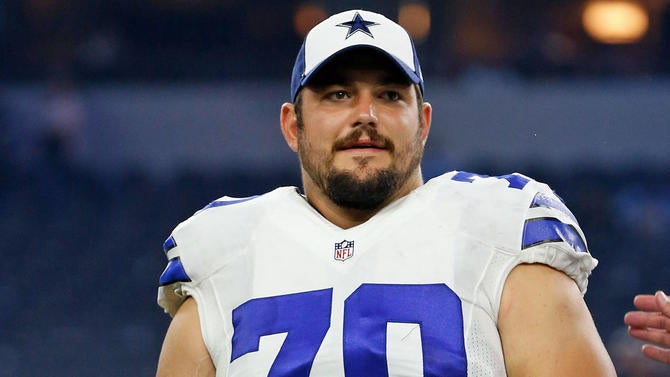
It remains to be seen whether the Cowboys stick with the league convention of left tackle sitting atop of the offensive line salary hierarchy, where Smith's $12.2 million per year average from his 2014 extension serves as a ceiling for Martin. His overall guarantees should easily exceed Frederick's, which are slightly over $28 million, but may fall short of Smith's $40 million.
Tony Romo's $14 million 2017 base salary coming off the salary cap on June 2 gives Dallas flexibility with the structure of Martin's extension. It may not be necessary for Martin's deal to be salary cap neutral in the first year with a huge spike in salary in the second year like Frederick's.
Aaron Donald, DL, Rams
The Rams didn't hesitate to pick up Donald's fifth-year option in 2018 for $6.892 million. It was one of the first options for 2014 first-round picks exercised by an NFL team.
Donald missed the start of voluntary organized team activities last week after previously attending voluntary offseason workouts and an April minicamp. General manager Les Snead acknowledged Donald's absence was contract related. Donald should get a new deal in 2017 no later than the middle of September if the Rams adhere to the same timetable they did for first-round picks Tavon Austin and Robert Quinn.
The 2014 Defensive Rookie of the Year has quickly become the NFL's most disruptive force from the interior of a defensive line. According to Pro Football Focus (PFF), Donald's 82 quarterback pressures (combined sacks, quarterback hurries and quarterback hits) were the third most in the league last season and led NFL interior defensive lineman. Donald took the top spot in PFF's top 101 players for the 2015 season. He was second in PFF's 2016 rankings.
Donald surpassing Suh as the NFL's highest-paid interior defensive lineman seems inevitable. Donald also has an excellent chance of replacing outside linebacker Von Miller as the NFL's highest paid non-quarterback. The six-year deal Miller signed last summer as the Broncos' franchise player averages $19,083,333 per year and has $70 million in guarantees. One area Donald is unlikely to beat Suh is in money fully guaranteed at signing. Suh's $59.955 million is an NFL record. No other player, not even a quarterback, has ever topped the $50 million mark in this metric.
Khalil Mack, DE, Raiders
It isn't a matter of if Mack will sign an extension, but when. Carr is a higher signing priority because the quarterback is entering his contract year, while Mack is under contract through the 2018 season thanks to a fifth-year option.
Mack has been everything the Raiders could have hoped for and more. He became the first player in NFL history to earn first team All-Pro honors at two different positions during the same season (defensive end and outside linebacker) in 2015. Mack followed up this outstanding campaign by being named the NFL's Defensive Player of the Year last season.
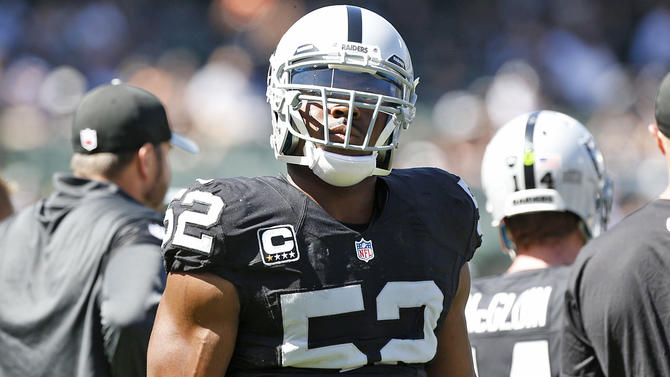
A new deal will likely make Mack the NFL's first $20 million per year non-quarterback. That is, if Donald doesn't beat him to it. If Donald gets a new deal first, his contract will serve as salary floor for Mack.
Xavier Rhodes, CB, Vikings
The Vikings have a track record of signing key players to extensions during contract years. This should bode well for Rhodes, who earned his first Pro Bowl berth last season. The five-year extension Desmond Trufant signed with the Falcons in April could serve as a barometer for Rhodes. Trufant, who was taken three picks ahead of Rhodes in the first round of the 2013 NFL Draft, received $68.75 million with $41.526 million in guarantees.
Kam Chancellor, S, Seahawks
General manager John Schneider has been deflecting questions about the possibility of Chancellor getting an extension. Chancellor can legitimately claim that he is underpaid, which wasn't the case when he engaged an ill-advised holdout in 2015 that lasted through the second game of the season because he was unhappy with the four-year, $28 million extension he signed in 2013. This deal running through the 2017 season made Chancellor one of the NFL's highest-paid strong safeties.
A lot has changed since then. The Seahawks rewarded teammate Michael Bennett, who expressed dissatisfaction with his own contract around the same time as Chancellor but didn't hold out, with a three-year, $29.5 million extension as the 2016 regular season was coming to a close.
Chancellor surely noticed the Dolphins' treatment of safety Reshad Jones, who was also a fifth-round pick in 2010, turned 29 this offseason like him and signed a similar deal in 2013. Jones, who was entering his contract year, signed a four-year, $48 million extension containing $33 million of guarantees in March despite missing the final 10 games of the 2016 season with a shoulder injury requiring surgery.
An extension in the same vicinity as Jones' could be too rich for Seattle's blood. Chancellor's eventual replacement may have been found in the third round of this year's draft with Delano Hill. Addressing Chancellor's contract like Jones' might create an issue with Earl Thomas, who became the NFL's highest-paid safety at $10 million with his 2014 extension. Thomas is under contract through the 2018 season.
Other extension candidates: Davante Adams, WR, Packers; Ezekiel Ansah, DE, Lions; Tyler Eifert, TE, Bengals; Gabe Jackson, OG, Raiders; Andrew Norwell, OG, Panthers; Justin Pugh, OG, Giants; Weston Richburg, C, Giants; Allen Robinson, WR, Jaguars; Stephon Tuitt, LB, Steelers; Trai Turner, OG, Panthers







